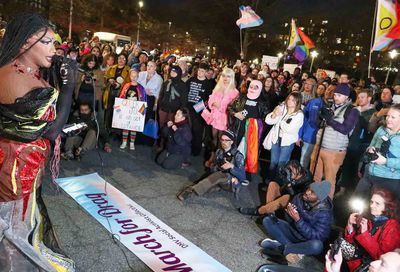‘Dream Scenario’ Review: Dream Boat
In the trippy brain-bender 'Dream Scenario,' Nicolas Cage stars as a man who keeps turning up in everyone’s literal dreams.

It’s not a career revival until you star in an A24 film helmed by a buzzy director decades your junior. That seems to be the new rule in Hollywood these days.
Just ask Adam Sandler, who revitalized his career with a sweaty, unforgettable performance in the Safdie brothers’ Uncut Gems, or Nathan Lane, who’s become a self-described “poster boy for A24” following recent roles in Dicks: The Musical and Beau Is Afraid.
Enter Nicolas Cage, whose once-flailing career has enjoyed a rebirth ever since his muted, mournful performance in the 2021 indie sleeper hit Pig. Cage’s subsequent return to major studio roles — playing a fictionalized version of himself in The Unbearable Weight of Massive Talent in 2022, and Count Dracula in 2023’s Renfield — proved less satisfying, with both films undermining his comedic work with gimmicky gags and deficient direction.
Joining forces with the buzzy film studio, the eccentric icon now gets his A24 moment — happily, in a film worthy of his comedic abilities. That’s to the credit of Norwegian filmmaker Kristoffer Borgli, who rose to prominence last year with the art-world satire Sick of Myself.
The film received substantial acclaim, enabling Borgli to assemble an enviable talent pool for his American debut, the Ari Aster-produced Dream Scenario, which Borgli wrote and directed. It’s a lightly trippy brain-bender of a film, buoyed by Cage’s best comic performance in many years.
A schlubby, balding Cage stars as Paul Matthews, an evolutionary biologist whose career isn’t quite what he had hoped. Paul is a tenured professor at a local college, but his students are unengaged by his lectures about zebras and his dreams of writing an acclaimed book have gone nowhere.
Though he’s insecure, and openly resentful of a former colleague who’s achieved greater success, Paul has a decent life, with a wife who loves him (Julianne Nicholson) and two daughters at home.
He’s flattered when an ex-girlfriend tells him he keeps popping up in her dreams. Turns out she’s not the only one. Paul’s life changes overnight when he begins appearing in the dreams of people all over the world. Restaurant hostesses suddenly recognize him. His students applaud him and ask for selfies. His Facebook inbox fills up with messages from strangers. He’s invited to appear on news programs, where scientists struggle to explain the bizarre phenomenon. As one talking head pontificates, “It’s like a dream version of the Mandela Effect.”

It’s a refreshingly original conceit. And Borgli, taking cues from Charlie Kaufman’s cinema of the subconscious (Being John Malkovich, etc.), keeps things engaging by weaving the dreams themselves into the narrative, letting the viewer get a glimpse of Paul’s cameos in the minds of others.
Paul’s bumbling, passive presence in people’s dreams becomes a fun running gag. In real life, he is frustrated to hear, over and over, that he just stood there and did nothing while some catastrophe was unfolding. The message is unavoidable: Even overnight celebrity can’t make this nebbishy man a suave operator.
Borgli’s screenplay satirizes a sprawling array of targets: academia, viral media, modern celebrity, digital marketing, cancel culture. At one point, Paul — eager to funnel his fame into a book deal — meets with a hip millennial advertising agency whose head, Trent (Michael Cera), tells him he’s “the most interesting person in the world” and then tries to persuade him to do viral marketing for Sprite.
In the film’s funniest, most unpredictable sequence, Paul goes out for drinks with the young assistant, Molly (Dylan Gelula), who tells him she has titillating sex dreams about him. We sense Paul’s ego boost — finally, a dream in which he is doing something (or someone…) — but things go mortifyingly wrong when Molly enlists Paul in a plan to reenact her horny dreams.
Alas, Dream Scenario’s third act is its weakest. As Paul’s behavior in other people’s dreams becomes violent and disturbing, his students start to fear him as a threat, and his marriage deteriorates. Borgli seems unsure how to end the story, though it’s a problem of too many ideas, not too few. The film veers into a commentary on cancel culture, though the satire lacks the nuanced bite and uncommon vérité of Todd Field’s Tár.
Even still, Cage’s performance remains utterly compelling, reminiscent of his dweeby persona in 2002’s Adaptation, with hints of his sinus-infection voice from Peggy Sue Got Married. Cage likes to affix an unusual voice to his most memorable characters.
And Paul is among the most vivid characters Cage has given us in years — cloying, needy, even downright pathetic, yet rendered three-dimensional and sympathetic. We instinctually sense this mediocre man’s hopes and dreams, even when other people’s dreams are all he seems to hear about.
Dream Scenario (★★★★☆) is playing in theaters nationwide. Visit www.fandango.com.
Zach Schonfeld is the author of the recently published How Coppola Became Cage ($34.95, Oxford University Press).
Support Metro Weekly’s Journalism
These are challenging times for news organizations. And yet it’s crucial we stay active and provide vital resources and information to both our local readers and the world. So won’t you please take a moment and consider supporting Metro Weekly with a membership? For as little as $5 a month, you can help ensure Metro Weekly magazine and MetroWeekly.com remain free, viable resources as we provide the best, most diverse, culturally-resonant LGBTQ coverage in both the D.C. region and around the world. Memberships come with exclusive perks and discounts, your own personal digital delivery of each week’s magazine (and an archive), access to our Member's Lounge when it launches this fall, and exclusive members-only items like Metro Weekly Membership Mugs and Tote Bags! Check out all our membership levels here and please join us today!






















You must be logged in to post a comment.